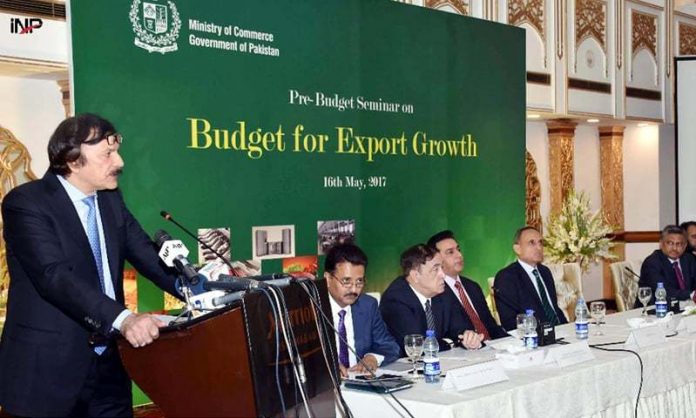ISLAMABAD: Special Assistant to Prime Minister on Revenue Haroon Akhtar Khan said on Tuesday the Federal Board of Revenue (FBR) will be taking into view proposals that boost the export sector.
Khan who was addressing a pre-budget seminar organised by the Ministry of Commerce said that it will not be easy to evade taxes. He urged people to pay their due share in taxes.
Khan also revealed that the FBR’s revenue target for the next FY will be set at over Rs4t, up from the current year’s target of Rs3.6t. He also informed that the issue of export refunds will be addressed in the upcoming budget.
Commerce Secretary Younus Dagha also shared budget proposals regarding tariff reduction, sales tax refunds and customs rebates that had been received by the ministry from various stakeholders. The budget proposals will be presented to the finance ministry and the FBR in the upcoming days.
The proposals have addressed the issue of release of pending refunds of around Rs150-200 billion, which can contribute towards increasing exports. The Refund Payment Orders (RPOs) have recently been rolled back on the grounds that the refund of sales tax on packaging material was claimed in violation of the understanding that exporters reached with the government when the prime minister announced a relief package for them.
The stakeholders have demanded that the reapproval of RPOs should be expedited after the adjustment of the disputed amount, which should be dealt with separately.
To avoid the piling up of refunds, it has been proposed that the targets of tax officers should be fixed on a gross collection basis. Currently, the deduction of refunds from their collection performance encourages tax officers to delay refunds.
The stakeholders demanded that the zero-rating facility should be extended for the five export-oriented sectors to the next year. It was proposed that the facility be extended to other export-oriented sectors, such as rice milling and processing, fish packaging and processing, meat and meat processing and pharmaceuticals.
The stakeholders have also demanded that the zero-rating facility be extended to cover packaging material, which is an essential input in value-added exports.
Furthermore, it was proposed that zero-duty on the import of raw materials that will be utilised in the manufacturing of export goods – or in local goods that have to compete with the zero-duty imported goods. It is high time such anomalies were removed from tariff lines to encourage export competitiveness and discourage imports of goods produced locally, the proposals stated.
The stakeholders regretted that goods imported by Afghanistan from other countries pass through Pakistan’s territory duty-free as per the transit trade facility. But exports from Pakistan’s bonded warehouses to Afghanistan are subject to 15pc general sales tax (GST). The proposals suggest that this anomaly should be done away with. Any misuse should be dealt with robust counterchecks rather than having to halt the export of goods, they said.
It is proposed that duty rebates under all schemes should be paid in the same manner by the bank at the time of remittance, and not processed at the FBR.
During the seminar, exporters proposed that duty on the import of primary raw material and machinery should be removed. They also proposed for an increase in duty on the import of finished items, abolition of regulatory duty on the import of certain items, zero-rating of sales tax on all inputs, including packaging material, suspension of export development surcharge for three years, withdrawal of the gas infrastructure development cess, coverage of the prime minister’s export package to non-textile sectors, export incentive bonus in the exchange rate, clearance of refunds and opening up e-commerce payment gateways in Pakistan.




